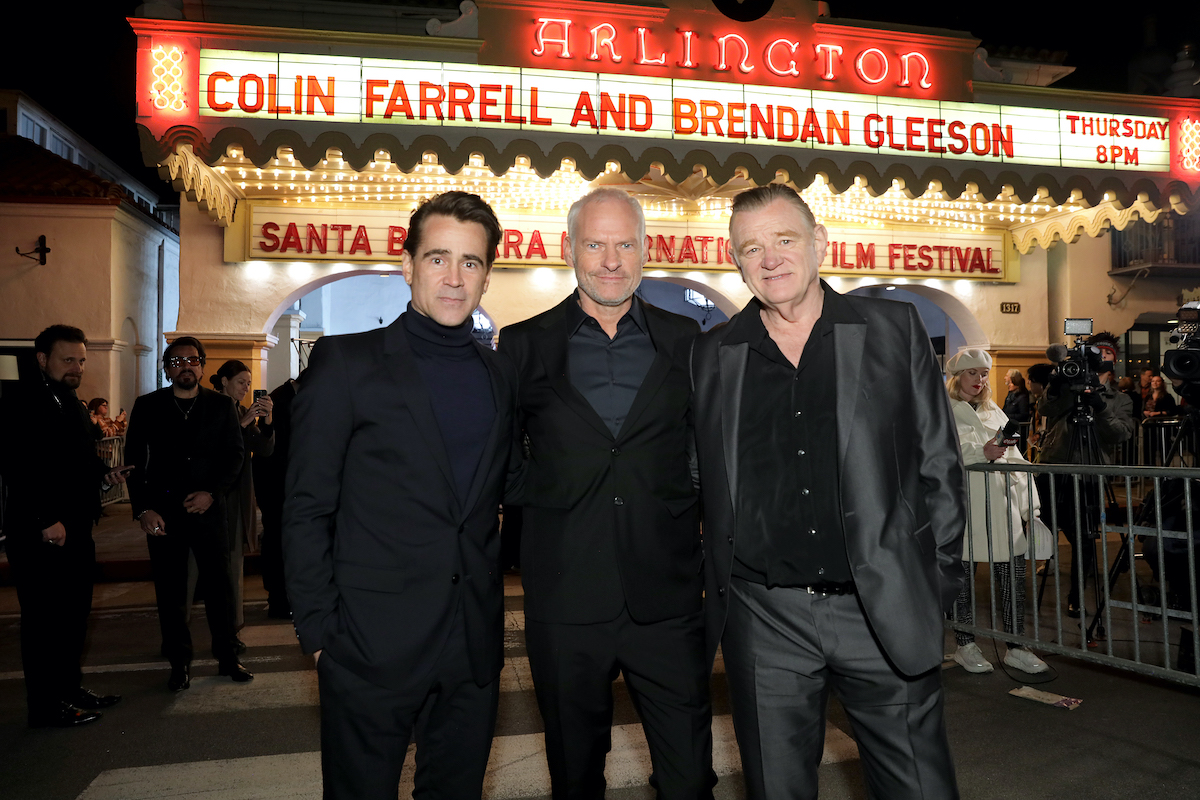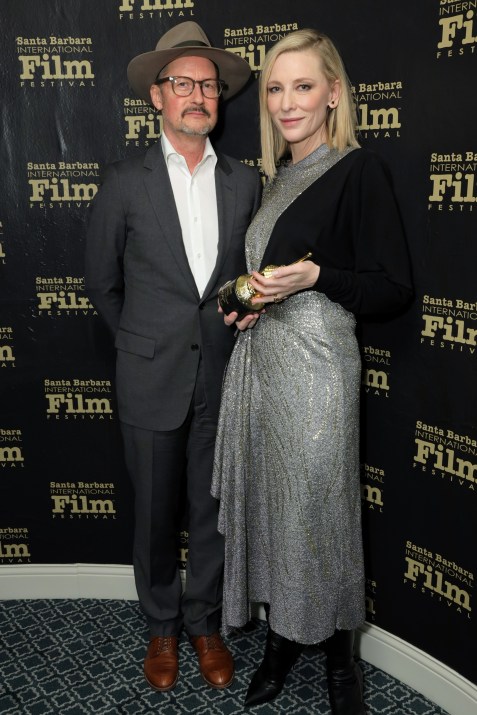Directors’ Cuts at the Santa Barbara International Film Festival
Panel Spotlights Todd Field and Martin McDonagh
Panel Spotlights Todd Field and Martin McDonagh

And then there were two…. As SBIFF’s illustrious list of tributes went into the home stretch on Friday night, the Outstanding Directors panel suddenly shifted from a threesome to a twosome. The Daniels, of Everything Everywhere All at Once fame, had to pull out on short notice, leaving only Todd Field (Tár) and Martin McDonagh (The Banshees of Inisherin) sharing the Arlington stage for the evening.
But the positive upshot was that closer attention and deeper diving could be granted these two stellar cinema figures. As different as the pair are, they share the distinction of having made two of the more artistic and challenging, yet still accessible, films of the past year. Both films have been duly laureled with Oscar nominations, including Best Picture, Best Director, and Best Screenwriting nomination honors.

Field, who showed up in a Boston baseball cap, sneakers, and a sweater, lives up to moderator Scott Feinberg’s “three for three” baseball analogy, having made three acclaimed films — In the Bedroom, Little Children, and Tár. Having briefly been an actor, with an IMDB résumé including Twister and Stanley Kubrick’s Eyes Wide Shut, Field had a close encounter with the business of acting to inform his directorial work.
Regarding his approach to working with actors, Field said, “Generally, I try to create an environment where the actors are the main focus. They should be the main focus. I’ve seen people getting obsessed with the mechanics of a schedule and production. They shouldn’t be expecting to be behaving like the key grip. They have a different job.
“A lot of times in filmmaking, you say ‘action’ and ‘cut,’ and after ‘cut,’ everybody gets really noisy on a film. But ‘cut’ is where you make the film. That’s when you figure out ‘What just happened, and how can we change it?’ That conversation can be very quiet; it can be internal, or it can be a dialogue with your actors.”
As we’ve heard in previous visits to the Arlington stage — on last week’s Writers Panel and presenting the award to the masterly Cate Blanchett — Field says that, although Tár takes place in the trenches of the classical world, the larger subject is “about power. How do you look at the ugly stick of power?” But he also reasoned that “we’re in the pretend business. It’s not a documentary. This is a fairy tale, and it’s meant to look at power.”
McDonagh’s own fairy tale, on the fictional Irish island of Inisherin, deals with the power shift of longtime friends suddenly thrown into disarray, as Brendan Gleeson’s despairing character moves away, lost in thoughts about the importance of art, to the dismay of the simple Colin Farrell character. The writer-director, who first teamed up with those actors in In Bruges, said “I don’t think art has to come through pain. I prefer an easy life,” he laughed. “We’ve all been in that place. But you don’t have to stay there.
“I’m on team Colin, but then he’s a little bit boring [his character in the movie], so what can you say?”
SBIFF head Roger Durling gave an impassioned speech before handing out trophies, praising each director’s particular aplomb in dealing with “artistry, both passionate and severe.” McDonagh “can blend Irish folksiness with absurdity,” while Field is “an auteur, who can be intense but also entertaining.”
One of my fave films in last year’s SBIFF crop was the quirky documentary One Road to Quartzsite, directed by Ryan Maxey and co-written and produced by Josh Polon. Polon returns to SBIFF this year, with another eccentric delight, albeit from an entirely different place and cultural GPS. With The Legend of Mexman, Polon concocts a hard-to-describe adventure in which documentary truth, neo-non-fiction and film-about-film qualities collide. Essentially, it’s an anatomy of an indie film project and a character study of the unique wannabe young filmmaker and twistedly charismatic character German Alonso, a film student at USC from El Monte, California, with a puppet and animation workshop in a at the El Monte airport.
Alonso has a menagerie of left-of-center action heroes in his repertoire of original characters, including Ob the Cat and Mexman, the latter of which has the potential of an investing producer, provided a “proof of concept” sequence can convince the moneyed facilitators to pony up the necessary capital. Action star Jason Beghe is enlisted, and squabbles over story credit and backside profit agreements mire the project in expected obstacle to getting things done and on-screen. An obsession with unrequited love and a hookup with an erotic mystic of a woman also muddy the waters of our hero’s mental focus. As he says, in one of many confessional interviews with the filmmakers (or is it stage? We don’t really know), “This isn’t a life. In a way, I’m a servant to all these characters.” Spoken like a true slave to the movie-making cause.
Too rarely, we in the west are privy to films of Palestinian origin, which makes the presence of the engaging film Alam in this year’s SBIFF program something of a revelation. Writer-director Firas Khoury has conjured up an illuminating film about life for Palestinians living in Israel, with a barely suppressed rage at the inhumane conditions. In effect, it’s a coming-of-age genre film, pushed far beyond the usual formula of said genre, in which Palestinians in high school grapple with the injustice of their social and familial existence and plot small actions of revolt, such as surreptitiously replacing the Israeli flag (“alam” translates to “flag”) at their school, but are thwarted in the attempt.
Young love, angry youth, and alienation figure into the story in an empathetic way, leading up to a climactic showdown with Israeli violence in response. In the end, their indigenous flag will wave, in a disarmingly affecting and subtle film set in a powder-keg piece of global real estate.
Music documentaries can tend to fall into familiar and ultimately forgettable categories, dwelling on the talking heads and archival footage method of storytelling. But something unique this way comes with the film Killing Me Softly with His Songs, director Danny Gold’s tribute to the famed (even if you didn’t know it) songwriter Charles Fox. Fox, whose long list of credits include the classic tune made famous by Roberta Flack, “Killing Me Softly with His Song,” TV theme songs for Happy Days, Love Boat, and Laverne and Shirley, and the Jim Croce–immortalized “I Got a Name” (sung in the film by son AJ Croce), is one of those hiding-in-plain-sight songwriters who helped implant musical memories in the collective unconscious.
What makes the film special is the fresh-baked, present-day relevance and location shooting, in which Fox, also a fine pianist with a passion for Latin jazz, is seen performing with a combo (including film composer of note Alexandre Desplat) in a Parisian jazz club, in a studio session with top session players Rita Wilson and Jason Alexander, and a special concert at the Havana Opera House. We also learn that he initially studied classical music with the legendary pedagogue Nadia Boulanger in Paris as a fledgling composer, taking to heart Boulanger’s emphasis on musical “truth” — all about “putting the notes together in a way that they cannot be changed. That’s the truth.” His songs do, in fact, kill, softly.
Please note this login is to submit events or press releases. Use this page here to login for your Independent subscription
Not a member? Sign up here.
You must be logged in to post a comment.